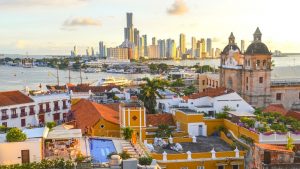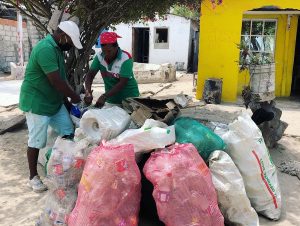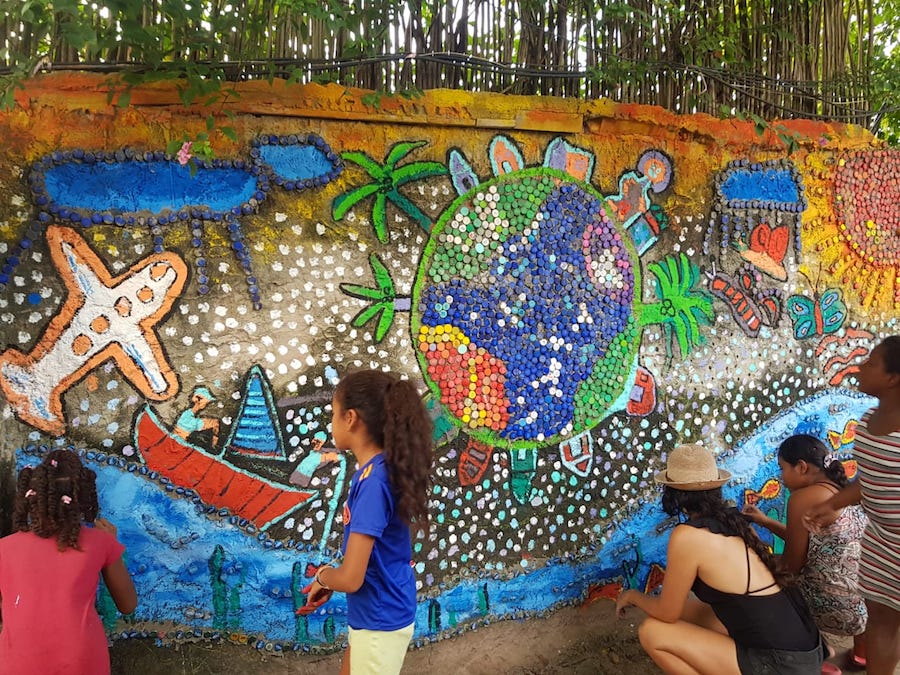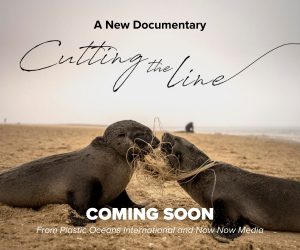Fundación Bahía Becomes Newest Member of Global Program
Cartagena, Colombia, has recently been added to Plastic Oceans International’s growing BlueCommunities initiative, making it the 14th location with this global program. Joining the effort there is local partner Fundación Bahía.
A historic city known for its stunning colonial architecture, vibrant culture, and serene Caribbean beaches, Cartagena is also increasingly rife with significant environmental challenges, not least of those relating to plastic and waste pollution. Its central bay, formerly composed of a rich variety of flora and fauna, is today void of much wildlife due to years of this waste dumping and plastic accumulation.

The ecelect skyline of Cartagena, Colombia.
Enter Diana de la Vega, a Cartagena native who returned to her beloved city after spending most of her adult life away, and was disheartened to see the ecosystem she cherished suffering immense environmental degradation.
“I grew up swimming and diving in these waters, navigating them, loving them,” she says. “But the last generation has seen such a shift to single-use items – and then the need to dispose of them – that the bay of my youth; the bay which is the heart of the city – has become a dumping ground for waste that will sit here for generations to come.”
Driven by the need to act in some way to the overwhelming plastic crisis, de la Vega decided to establish an organization focused on creating “a clean bay, with clear waters, as it was before, with corals, mangroves, turtles, fish, and dolphins.” But she knew it was not something she could achieve alone. As such, and to make her vision a reality, she decided to capitalize on the power of direct engagement, education, and art to initiate lasting change in the environmental and social fabric of Cartagena.

The Fundación Bahía team working hard to keep Cartagena clean.
Consequently, the core components of Fundación Bahía are its plastic cleanups and diverse educational programs. Since its inception, the organization has kept 250 tons of plastic out of the ocean through beach cleanup days involving hundreds of volunteers, and functional art installations that serve both as environmental reminders and areas to deposit plastic waste. These cleanup journeys take place both on the beaches of Cartagena and on the surrounding islands of Tierra Bomba and Chivo, which have faced similar environmental destruction and are crucial to the ecosystem of the bay.
But beyond cleanups, education is really where the generational change lies for the organization, in particular by making the environment real and tangible for Cartagena’s residents. While de la Vega remembers having had many opportunities to explore the ocean in her youth, she noticed how a significant portion of children in Cartagena today have never experienced the ocean outside the perimeter of the city, and thus have little knowledge of its former ecosystem and current environmental state. For this reason, Fundación Bahía founded a marine education program, in which local and international volunteers board the boat Antares 71 to learn about local waste issues and travel to island beach cleanups. This creative approach to environmental education has allowed many local children to both learn about and experience the state of the ocean hands-on, preparing them to be passionate, active guardians of the bay in the future.

Fundación Bahía art-based workshop in Cartagena, Colombia.
While Fundación Bahía has already made a marked impact on the waters of Cartagena, de la Vega has grand ambitions for the future. In underserved communities such as Tierra Bomba, for instance, Fundación Bahía plans to launch sustainable development programs based on ecotourism and waste management practices such as composting. Additionally, Fundación Bahía is planning to adopt an advanced system of waste capture in Cartagena Bay, and restore the lagoon known as Laguito, which until 2007 was connected to the rest of the ocean ecosystem. These efforts will undoubtedly build upon the organization’s current work, creating the Cartagena Bay that de la Vega once experienced and has reimagined.
Part of that future starts now, with Fundación Bahía’s entry into the BlueCommunities program of Plastic Oceans International.

The beauty and power of art as a tool for education at Playa Punta Arena.
“I have been so impressed by the community work Fundación Bahía has been doing all these years,” says Mark Minneboo, Regional Director for Latin America at Plastic Oceans International. “The number of people they reach is amazing! Their programs are not just focused on cleaning up the environment, but have successfully integrated human wellbeing and social entrepreneurship as well. Inspiring across so many levels.”
As Minneboo intimates and de la Vega clearly recognizes, community outreach has to be so much more than just a message delivery service, but rather an all-inclusive, multi-strand body of work engaging citizens in all aspects of growth. As such, Fundacíon Bahía reminds us of the sheer power and extensive reach inherent to genuine community organizing. Markedly, de la Vega’s organization is not just cleaning the waters of Cartagena, but stimulating a sociocultural shift that will propel the next generation to be active stewards of this dynamic ecoregion.
Progressive activism, it seems, really always does start at home.
Sophie Liebel and Jon Bonfiglio are part of the environmental journalism team working in Latin America with Ninth Wave Global.

